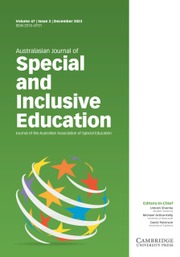No CrossRef data available.
Article contents
Developing a Case for Special Provisions During Examinations
Published online by Cambridge University Press: 05 November 2020
Abstract
Education is a human right of every child and adolescent. The impact of a disability such as cerebral palsy should not pose barriers to this right because of structures within education environments (e.g., rigid examination conditions). Students within Australia with a disability are supported by legislation that ensures they can participate in education, like assessments, on the same basis as their peers without disability. This case study provides an applied example of how one school addressed the barriers posed by examination processes, and ensured that this student, with specific needs due to the impact of cerebral palsy, could access examinations on the same basis as her peers without disability.
- Type
- Special Education Perspectives
- Information
- Australasian Journal of Special and Inclusive Education , Volume 45 , Issue 1 , July 2021 , pp. 90 - 95
- Copyright
- © The Author(s) 2020
Footnotes
This manuscript was accepted under the Editorship of David Paterson.


